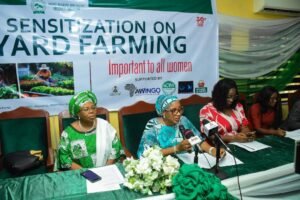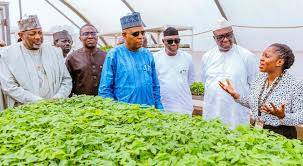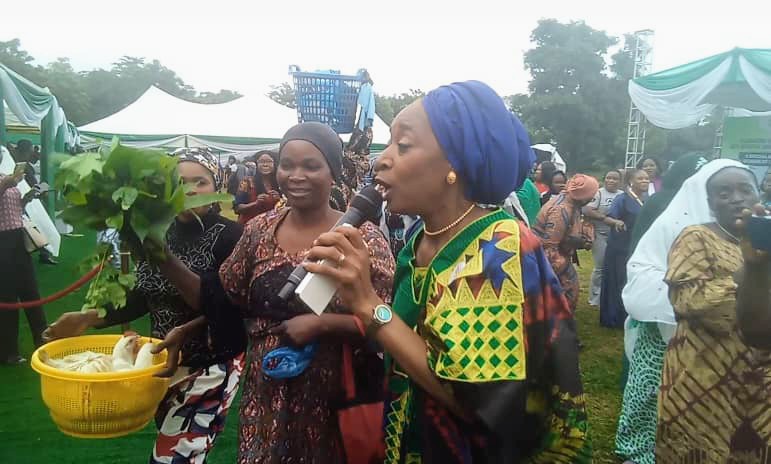Sani distributes free fertiliser to 100,000 farmers, launches crop insurance scheme
By Hussaina Yakubu
Gov. Uba Sani has reaffirmed his administration’s commitment to transforming the agricultural sector of Kaduna State by distributing 400 trucks of free fertiliser to 100,000 smallholder farmers.
Sani made this known at the inauguration ceremony on Saturday at Murtala Square, Kaduna.
The governor also enrolled the beneficiaries onto a crop-risk insurance scheme, underscoring his government’s “enduring commitment to inclusive development, food security, and rural prosperity through agricultural transformation.”
The governor further explained that the scheme would protect farmers against losses from pests, diseases, and adverse weather linked to climate change.
According to him, each of the 100,000 smallholder farmers will receive two bags of fertiliser free of charge, pointing out that the state remained the only state where smallholder farmers consistently receive fertiliser and other critical inputs at no cost.
The governor maintained, “We are proud to maintain this farmer-first policy, particularly for our most vulnerable and underserved communities.”
Sani recalled that in 2024, Kaduna State executed its largest-ever fertiliser distribution over 500 trucks and launched several empowerment initiatives including support for dry season farming, ginger recovery programmes, and mechanisation with 200 tractors.
The governor also announced a subsidised fertiliser programme for commercial farmers as part of his administration’s bid to boost agriculture, at the free fertiliser distribution ceremony to smallholder farmers.
“We are providing access to 10 bags of fertiliser per farmer at a 40% subsidised rate of N30,000 per bag.
*This is to lower their production cost, support job creation, and stabilise commodity prices in the open market,’’ he added.
Sani attributed the success of these agricultural initiatives in part to improved security across the state whereby, a large portion of previously inaccessible farmlands are now accessible.
The governor described the distribution of free fertiliser and crop risk insurance scheme as part of the fulfilment of his campaign promises, recalling, “we pledged to elevate agriculture from subsistence activity to a driver of growth, jobs, and dignity.’’
Sani stated that the astronomic increase in the agriculture sector’s funding, from a budgetary allocation of ₦1.48 billion in 2023 to ₦74.02 billion in 2025, marked a remarkable 4,871 per cent increase.
He pointed out that as a share of the overall state budget, agriculture had grown from just 0.4 per cent in 2023 to 10 per cent in 2025.
Sani added, “This fertiliser distribution to farmers is not a stand-alone event it is part of a strategic, coordinated, and systems-based approach to agricultural transformation.”
The governor, who urged the beneficiaries to use the inputs responsibly, praised all the stakeholders for their role in ensuring transparency in the entire exercise.
He added, ‘’Together, we will continue building a Kaduna State where agriculture is not just a way of life, but a pathway to prosperity.’ ’(NAN)(www.nannews.ng)
Edited by Bashir Rabe Mani
Scientists to study Nigeria’s okra, melon during NASA’s space mission
By Ijeoma Olorunfemi
International astronauts will research on six indigenous Nigerian crops and seeds during the National Aeronautics and Space Administration’s (NASA) Crew-11 Mission.
The crops selected by NASA are okra, cowpea, Guinea corn (sorghum), amaranth, maize, and melon. They would be studied to understand their behavioural patterns towards climate resilience, food security and the future of agriculture in space.
Dr Felix Ale, Director of Media and Corporate Communications, National Space Research and Development Agency (NASRDA) said this on Thursday in a statement issued in Abuja.
NASA is an independent agency of the U.S. government responsible for its civil space programme, aeronautics research and space research.
The Crew-11 Mission, Ale said, will blast off from the Kennedy Space Centre, Florida, championed by Jaguar Space.
“This mission carries the World Seeds Payload, a groundbreaking international agricultural experiment spearheaded by Jaguar Space, with contributions from eleven emerging space faring countries, including Nigeria.
“Nigeria’s contribution to this landmark mission includes six indigenous crop seeds, okra, cowpea, Guinea corn (sorghum), amaranth, maize, and melon which are selected for their nutritional and agricultural significance.
“These seeds will be studied aboard the International Space Station (ISS) to explore their behaviour under microgravity, contributing to research on climate resilience, food security and the future of agriculture in space,” Ale said.
He said the seeds were delivered to the U.S. following the signing of a Memorandum of Understanding between NASRDA and Jaguar Space.
Ale said this was the first time Nigeria would be participating in such with biological payload flying aboard a crewed NASA mission to the ISS.
“It reinforces NASRDA’s commitment to applying space science toward sustainable development and global scientific cooperation.
“Participation in this flight experiment now offers the opportunity to validate findings of the agency on gravity simulation studies on similar crops in a real space environment.
Ale said Mrs Olayinka Fagbemiro, Assistant Director, International Cooperation and Linkages Department and the Project Lead for Nigeria on the project, will represent the agency at the inauguration.
Jaguar Space is a bioastronautics and business consulting firm dedicated to advancing science and commerce in space. (NAN)(www.nannews.ng)
Edited by Uche Anunne
Nigeria partners WFP on climate smart agricultural solutions
Nigeria commits $538m on SAPZ – Shettima
Nigeria maps 10-year youths-led agricultural renewal plan
Group advocates backyard farming to build self-reliant communities
By Dorcas Jonah
A Non-Governmental Organisation (NGO), Farm Flowers and Allied Products Initiative (FFAP), has called on women to embrace backyard farming to build stronger, healthier, and more self-reliant communities.
The president of the FFAP, Mrs Christy Sani Yakubu, made the call on Thursday at a Sensitisation Programme on Backyard Farming, organised by FFAP in Abuja.
Yakubu said that backyard farming was more than just planting vegetables behind the house.
According to her, it is a powerful tool for household resilience, especially for women who are often the primary providers of food and nutrition within the family.
“Backyard farming empowers families to grow their own fresh produce, reduce dependence on external food sources, and make healthier dietary choices.
“At a time when food prices are rising, climate change is affecting what we grow, and many families are struggling to put meals on the table.
“Backyard farming gives us a practical and empowering way to take control of our lives,” FFAP boss said.
According to her, backyard farming may seem small, but its impact is powerful.
“With a few square feet of land, or even containers, we can reduce costs, generate small incomes, and teach our children the value of self-reliance and environmental care,’’ she said.

Yakubu urged participants to explore the programme to exchange the ideas and make backyard farming a reality in their homes and neighbourhoods.
Earlier, the National President of the National Council for Women Societies, (NCWS) Nigeria, Mrs Ednah Azura, advised participants to take full advantage of the knowledge and tools shared in the training.
Azura, represented by the National Newsletter Editor, Mrs Comfort Ahua, said that the initiative was timely and significant, as it aligned with NCWS vision of empowering women through sustainable agricultural practices and food security.
“Backyard farming, beyond being a means of livelihood, also ensures improved nutrition, self-reliance, and a greener environment for our communities.
“I wish to sincerely thank the hosts, FFAP for creating this inclusive platform that prioritises women’s empowerment and practical knowledge.
“Your work is commendable and aligns strongly with NCWS’s commitment to economic empowerment at the grassroots level,’’ she said.
Presenting training on backyard farming, Mr Obasi Sunday, Desk Officer, Horticulture-Medicinal Plant, Federal Ministry of Agriculture, said backyard farming offers numerous benefits, including access to fresh, healthy food and exercise, and a connection with nature.
Sunday described it as a stress reliever, a way to learn new skills, and a means to reduce environmental impact. (NAN)(www.nannews.ng)
Edited by Deji Abdulwahab
Bayelsa: Group raises fund for federal agric varsity take-off
By Nathan Nwakamma
The Federal University of Agriculture Support Group says it has raised N232 million to support the take-off of the newly established Federal University of Agriculture, Bassambiri, Bayelsa.
The Coordinator, Dr Ala-Peters David, said at a fundraiser in Yenagoa that the gesture was to ensure that the federal university took-off without delays.
David also stated that the move was in compliance with the presidential directive that all newly established universities should commence activities by September.
He said that although the university was a federal institution, Bayelsa people would be its direct beneficiaries, saying, “education is the bedrock of every society”
The coordinator further said that the university was the first higher institution in Bassambiri, Opu-Nembe, and that it was necessary to support its take-off.
David said that well-meaning indigenes of Bayelsa should support the growth and development of the school.
Also speaking at the event, Gov. Douye Diri of Bayelsa said that the state government had done a critical assessment and appraisal of the institution.
Represented by the Education Commissioner, Dr Gentle Emelah, Diri said that the government was committed to assisting towards providing basic facilities for the university.
He said that his administration was committed to giving priority attention to education and the general wellbeing of Bayelsa people.
Speaking at the sidelines of the event, Bob Manuel, the Chief Executive Officer, Bontrac Tractors Limited, described the idea behind the university as ‘great and timely’
“Agriculture should be given the right attention. Agriculture alone is capable of tackling the employment challenge in the Niger Delta and Nigeria at large.
“I urge well-meaning Nigerians to support the university’s take-off and development, it is in our interest,” he said. (NAN)(www.nannews.ng)
Edited by Azubuike Okeh
Why Tinubu declared state of emergency on agriculture – Shettima
First Lady’s home garden project a huge success in FCT – Coordinator
By Philip Yatai
First Lady Oluremi Tinubu’s “Every Home a Garden” project is recording a huge success in the Federal Capital Territory (FCT), says the FCT Coordinator, Dr Adedayo Benjamins-Laniyi.
Benjamins-Laniyi, who is also the Mandate Secretary, FCT Women Affairs Secretariat, stated this at the close-out of the 2024 cohort of the Renewed Hope Initiative (RHI) Every Home a Garden competition, in Abuja.
She said that the event was also organised to celebrate FCT women for queuing into the competition, initiated by the First Lady, which she described as a “huge success.”
She said that the project, under the RHI Agricultural Support Programme has continued to impact the lives of rural women across the FCT.
According to her, the project is not only promoting self-reliance but improving nutrition and economic empowerment through backyard gardens.
She explained that the competition began in July 2023 to encourage women in the 36 states of the federation and the FCT to practice home gardening.
She said that the women were encouraged to use traditional and modern gardening methods to create gardens at home.
“This lofty initiative was conceived to enhance immediate and sustainable food supply in the home and the country at large.
“The home garden idea is further aimed at promoting self-sufficiency, improving well-being, ensuring food security, reducing high cost of living and encouraging culture of sharing and communal living.
“On a broader scale, the initiative is targeting at redirecting the consciousness of Nigerians towards developing interest in farming, using any available space within the premises of every home.
“It is a bold attempt to reset Nigeria on the path to revitalising her vast agricultural endowments across the 36 states of the federation and the FCT, with women leading the way,” she said.
Benjamins-Laniyi added that to participate in the competition, the FCT Women Affairs Secretariat inaugurated a committee, who reached out to women in the territory and guided them through the processes.
She said a total of 416 video entries were received and their gardens were also physically inspected by the committee and members of the panel of jurists.
She said that the panel assessed all the entries based on location of garden, variety of vegetables, use of available space, and alternative gardening methods.
Other criteria, she said, included the garden capacity to add value to domestic needs of the family and decency in the garden among others.
The coordinator said that at the end of assessment, Hajiya Hauwa Aminu emerged the winner in FCT, and also emerged among the top three at the national level.
She also said that Mrs Victoria Obiolor and Mrs Pamela Ashiedu came second and third place respectively.
“Today, we are gathered to commend the efforts of these women for participating in the competition. You all gave your best.
“You now belong to the women agro network in FCT, which shall stand as reference for further actions in terms of empowerment and capacity building in farming.
“You would not be abandoned,” she assured the women.
For continuity, the coordinator said that the close of the 2024 competition equally marks the commencement of the 2025 edition of the competition.
“I strongly believe that our gathering here today is a pathway for a better tomorrow for these women seated before us.
“You should, therefore, be ready for further engagements that would put smiles on your faces,” she said.
Also speaking, Minister of State for Agriculture and Food Security, Sen. Aliyu Abdullahi reaffirmed the ministry’s commitment to grassroots agricultural empowerment.
Abdullahi commended the first lady for the initiative saying, “it is completing the efforts of President Bola Tinubu in repositioning the agricultural sector”. (NAN)
Edited by Abiemwense Moru













